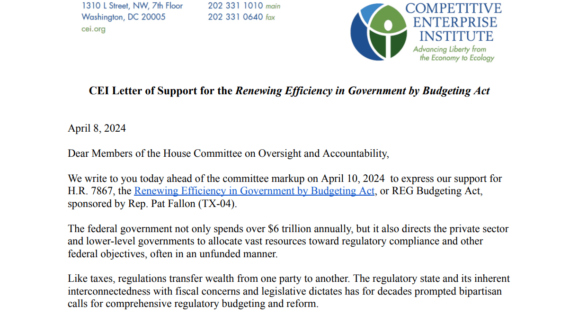CEI Coalition Letter in Support of the Renewing Efficiency in Government by Budgeting Act
April 8, 2024
Dear Members of the House Committee on Oversight and Accountability,
We write to you today ahead of the committee markup on April 10, 2024 to express our support for
H.R. 7867, the Renewing Efficiency in Government by Budgeting Act, or REG Budgeting Act,
sponsored by Rep. Pat Fallon (TX-04).
The federal government not only spends over $6 trillion annually, but it also directs the private sector
and lower-level governments to allocate vast resources toward regulatory compliance and other
federal objectives, often in an unfunded manner.
Like taxes, regulations transfer wealth from one party to another. The regulatory state and its inherent
interconnectedness with fiscal concerns and legislative dictates has for decades prompted bipartisan
calls for comprehensive regulatory budgeting and reform.
Indeed, bipartisan support for regulatory budgeting dates back at least to 1979, when then
Democratic Sen. Lloyd Bentsen (Texas)—who later served as Treasury Secretary in the Clinton
Administration—proposed “an annual cap on the compliance costs each agency could impose on the
private sector” and “coordinat[ing] the regulatory and fiscal budgets.”
Regulatory budgeting was also proposed in President Jimmy Carter’s 1980 Economic Report of the
President, observing that “the Federal budget is an increasingly inadequate measure of the resources
directed by government toward social ends.”
Current disclosure norms grow increasingly worrisome. Agencies issue more than 3,000 new rules
annually, yet Members may have noticed the White House Office of Management and Budget’s
(OMB) Report to Congress on the Benefit and Costs of Federal Regulation is routinely overdue, even
as thresholds for review have been increased by recent executive action and OMB’s presumed
oversight role has shifted toward more of a regulatory enabler and promoter than watchdog.
The REG Budgeting Act is rooted in modest and already widely appealing aspirations for discipline
and prudence, modifying the bipartisan Unfunded Mandates Reform Act of 1995 (UMRA) by simply
capping incremental unfunded government-wide regulatory costs under the guidance of the OMB
Director in coordination with agencies. Congress would approve increases in overall total regulatory
costs.
The incentives to cap costs and make commonsense trade-offs bear some resemblance to President
Trump’s Executive Order 13771, a measure that mimicked “one-in, one-out” budgeting procedures
like those in Canada and the U.K. that enjoyed cross-spectrum political support. Observing again the
bipartisan pedigree of measures addressing incremental burdens, Virginia Democratic Sen. Mark
Warner proposed a one-in, one-out “pay as you go” cost freeze for regulations in a 2010 Washington
Post article titled, “To revive the economy, pull back the red tape.”
The committee’s April 10 markup of the REG Budgeting Act is elemental to permanently restoring
oversight and accountability over what all Members must surely recognize to be an administrative
state that qualifies as comprehensive, to say the least, and which should be subordinate to them.
Acting now is particularly prudent given that the character of federal spending during COVID and
since—via the likes of the Infrastructure Investment and Jobs Act, Inflation Reduction Act, and the
CHIPS and Science Act—is also inherently regulatory in nature. Small businesses, states, and
localities are vulnerable to new unfunded federal regulatory burdens in the wake of these
interventions. That stark reality will make the wisdom of the REG Budgeting Act increasingly
apparent and render its urgency equivalent to that of the original bipartisan UMRA.
For example, in the Fall 2023 Unified Agenda of Regulatory and Deregulatory Actions, 690 of the
3,599 rules in the regulatory pipeline (pre-rule, proposed, final, and recently completed stages) affect
small business and local governments. That is considerably higher than the Trump years when many
rules were intentionally “deregulatory,” for a still-lower net. Members should be aware that the
critical and impactful subset of rules affecting small business deemed “significant” exceeds
Obama-era levels.
Similarly, rules affecting state and local governments—the very sort that spurred UMRA in the first
place—now stand at levels not seen in at least a decade. Agencies report that 349 of the 3,599 rules
in the Fall 2023 Agenda pipeline affect local governments, while 507 affect state governments.
Policymakers are very likely facing a forthcoming reemergence of governors and state and local
legislators realigning to voice their concerns over rising mandates—just as they did 30 years ago.
We therefore encourage Members of the Oversight Committee to advance this commonsense
legislation. Naturally, exceptions to capping are allowed for rules deemed necessary due to
emergencies, enforcement of criminal laws, national security, or international trade agreements.
Our current situation resembles the mid-90s, when external pressures drove the parties to closely
collaborate not only on UMRA but also on paperwork reduction, small business regulatory relief, and
other advancements in accountability and disclosure. Congress can take the initiative by moving
forward on the REG Budgeting Act now, thereby affirming appropriate congressional oversight and
publicly beneficial reporting requirements, and reversing widely acknowledged over-delegation.
Keeping a watchful eye on the regulatory state and protecting the public from unnecessary burdens
are solemn duties. We again reaffirm our support for the REG Budgeting Act and its promotion of
sound public policy.
Clyde Wayne Crews Jr.
Fred L. Smith Fellow in Regulatory Studies
Competitive Enterprise Institute
Matthew Adams
Senior Government Affairs and Coalitions Manager
Competitive Enterprise Institute
